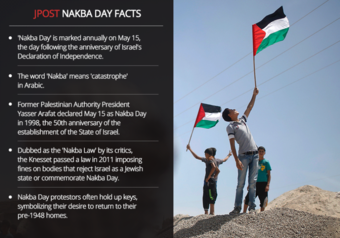Nakba Day
 Commemorated by Palestinians on 15 May each year | |
| Description | Palestinian commemoration of the 1948 ethnic cleansing |
|---|---|
Nakba Day (Yawm an-Nakba, meaning "Day of the Catastrophe") is generally commemorated by Palestinians each year on 15 May, the day after the Gregorian calendar date when Israel declared its independence on 14 May 1948.
Nakba Day was inaugurated by PLO chairman Yasser Arafat on the fiftieth anniversary in 1998.[1]
Origin
The Nakba, also known as the Palestinian Catastrophe was the 1948 permanent displacement of a majority of the Palestinian Arabs. The term is used to describe both the events of 1948 and the ongoing occupation of the Palestinian territories (the occupied West Bank and the Gaza Strip) and ongoing persecution and displacement of Palestinians throughout the region.
The foundational events of the Nakba took place during and shortly after the 1948 Palestine war, including 78% of Mandatory Palestine being declared as Israel, the expulsion and flight of 700,000 Palestinians, the related depopulation and destruction of over 500 Palestinian villages by Israeli armed forces and subsequent geographical erasure, the denial of the Palestinian right of return, the creation of permanent Palestinian refugees, and the "shattering of Palestinian society". The expulsion of the Palestinians has since been described by some historians, including Israeli ones such as Benny Morris and Ilan Pappé, and Nakba researchers, such as Salman Abu Sitta, as an ethnic cleansing.
In 1998, Yasser Arafat proposed that Palestinians should mark the 50th anniversary of the Nakba, declaring 15 May, the day after Israeli independence in 1948, as Nakba Day and formalising a date that had been unofficially used as early as 1949.
The Nakba greatly influenced the Palestinian culture and is a foundational symbol of Palestinian identity, together with "Handala", the keffiyeh and the symbolic key. Countless books, songs and poems have been written about the Nakba. Palestinian poet Mahmoud Darwish described the Nakba as "an extended present that promises to continue in the future."
The Nakba is a subject of significant contention. Some critics argue that the narrative overlooks certain historical complexities, such as attacks against Israel and the situation of Jewish refugees from Arab lands. Israel has implemented legislative measures, such as the 2009 ban on using 'Nakba' in school textbooks and the 2011 Nakba Law, to curtail its commemoration. Concurrently, Nakba denial, viewed by some as a form of historical negationism central to Zionist narratives, has persisted, with laws and grassroots efforts both perpetuating and challenging this denial.[2]
Related Documents
| Title | Type | Publication date | Author(s) | Description |
|---|---|---|---|---|
| Document:Britain’s secret defence plan with Israel | Article | 9 October 2024 | John McEvoy | “When it comes to war and foreign policy – including our relationships with states currently under investigation for genocide – the UK is little more than a dictatorship, concealing from the public key details of relations with Israel, the most violent and destabilising state in the Middle East” (former British soldier Joe Glenton). |
| Document:Condemnation of mass killings in Gaza | Article | 15 May 2018 | Hans Köchler | "The deliberate targeting of civilians by the Israeli army – inside the territory of Gaza – constitutes a war crime and crime against humanity. Those responsible must be brought to justice – in conformity with the Statute and on the basis of the jurisdiction of the International Criminal Court (ICC) of which Palestine is a State Party." |
| Document:Gaza massacre should be a turning point for British Jews | blog post | 16 May 2018 | Aron Keller | The 2018 Gaza Massacre represents a turning point which eliminates any existing moral ambiguity around Israel’s treatment of the Palestinians. The sheer scale of the bloodshed makes the cognitive dissonance required for any decent individual to absolve Israel of culpability too difficult to sustain. |
| Document:UK Labour Party is right to drop racist IHRA guidelines of anti-Semitism | Article | 6 August 2018 | The International Holocaust Remembrance Alliance (IHRA) Anti-Semitism definition guidelines the Labour Party are correctly omitting, are designed by Israeli propagandists to aid their many mass lobby attempts to stop international solidarity with the Palestinians and to deny Palestinians the right to express the nature of Israel’s 70 years of violence and racism towards them. |
References
Wikipedia is not affiliated with Wikispooks. Original page source here